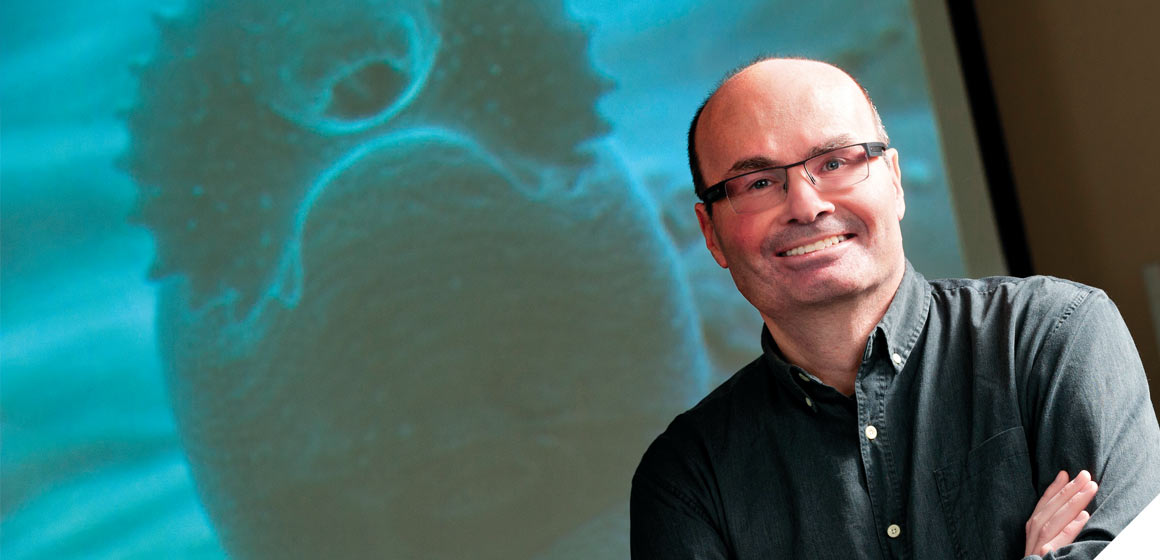 Monday 3 February 2014 11:10am
Monday 3 February 2014 11:10am2013 Distinguished Research Medal recipient Professor Robert Poulin is investigating the potential effects of climate change on parasites and the far-reaching implications these might have.
Researching the effects of climate change on polar bears is more obvious and arguably more glamorous, but University of Otago research on the effects of global warming on parasites could end up being more revealing.
Poulin (Zoology) and his group of research fellows, researchers and postgraduate students are investigating the effects of climate change on parasites as part of a wider research interest in parasite ecology and evolution.
They have created mini-oceans in laboratory aquaria in which they conduct experiments on parasites and hosts.
"We are interested in what is likely to happen as temperatures on average rise in the oceans, the pH, or acidity, of the water increases and the salinity of the water is altered as a result of climate change," says Poulin, who has been awarded the University's highest research honour, the Distinguished Research Medal, for the quality and quantity of his research on parasites over two decades.
"We are interested in how that will impact the way parasites affect their hosts and how it will affect the rate at which parasites get transmitted from one species to another. And we are finding that the impacts are unlikely to be small.
"We measure how fast the parasites reproduce at different temperatures, how well their little larvae do at surviving outside the host to find another host, how well they do at infecting that new host and how they impact the mortality of that host.
"We get data from all these experiments and then build mathematical models that allow us to predict, at the population level, what will happen to the hosts if the temperatures were to increase on average by one degree, by two degrees, by three degrees."
"We are interested in how that will impact the way parasites affect their hosts and how it will affect the rate at which parasites get transmitted from one species to another. And we are finding that the impacts are unlikely to be small."
Poulin gives the example of trematodes (flatworms or flukes) that inhabit aquatic snails. As the temperature rises, the parasite factory inside the snails dramatically increases its production and more parasite larvae are expelled into the water by the snails to contact and burrow inside aquatic crustaceans serving as their next hosts.
"Our models are telling us that the local populations of some of the smaller crustaceans, for instance, will not survive the increase in infection and will disappear if the temperature goes up by two to three degrees. And an increase of two to three degrees is within the predictions made by the Intergovernmental Panel on Climate Change for our part of the world."
As if a climate-change induced increase in parasites is not enough to try to cope with, Poulin says the crustaceans might also suffer a reduction in resistance to infection as a result of changes in water temperature, salinity and acidity caused by climate change.
To counter any lack of remorse over the fate of these aquatic arthropods, Poulin says the consequences extend far beyond the demise of the crustaceans themselves.
"These crustaceans are at the base of a food web that supports the species that people care about. Small crustaceans are the main food for many coastal birds. Fish also feed on these little crustaceans, and birds and mammals feed on the fish. The crustaceans are part of a chain and, if they go, others would follow."
Poulin says their predictions are based on the current gene pool of these organisms and one thing they cannot do in the laboratory is mimic evolution.
"There might be enough time for evolution to select for more tolerant crustaceans or for snails that would not allow the parasites to multiply so much within them. There is a range of evolutionary phenomena that could happen, and thus the models' results should be interpreted with caution."
Poulin says climate change might also result in parasites expanding their range as temperatures become more suitable for them and the parasites encounter new hosts that have no immune defences against them. He gives the example of a mosquito introduced to the North Island that spreads malaria between birds.
"That mosquito likes it in the north, but does not do well at Dunedin latitudes. If the climate were to change, the mosquito might expand its range our way, exposing new local bird populations to malaria infections and potentially impacting rare endemic birds. There could be serious consequences for these animals."
Poulin says the research has heightened his concerns about climate change.
"It gives me more of a personal angle because I know of one possible consequence related to parasites that others don't seem to be interested in. And I know that the consequence can be quite drastic. But it's very difficult to get anyone, whether it is the private sector or the government, to take the measures that would be necessary now to cause a reversal of what is happening. Mitigation seems to be the best we can hope for."
Funding
- Marsden Fund
- University of Otago Research Grant
